Invictus
 for brief strong language.
for brief strong language.
Reviewed by: Daniel Thompson
CONTRIBUTOR
| Moral Rating: | Better than Average |
| Moviemaking Quality: |
|
| Primary Audience: | Adults Teens |
| Genre: | Biography Drama |
| Length: | 2 hr. 14 min. |
| Year of Release: | 2009 |
| USA Release: |
December 11, 2009 DVD: May 18, 2010 |
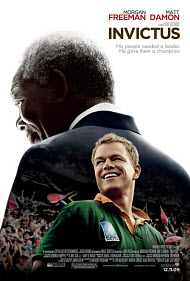

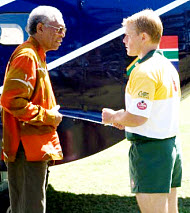
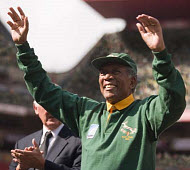
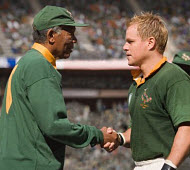
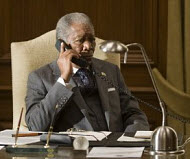
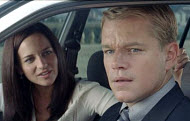
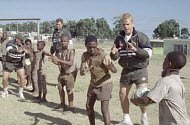
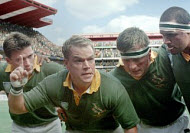
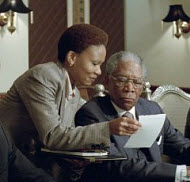

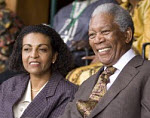
How do I know what is right from wrong? Answer
REVENGE—Love replaces hatred—former israeli soldier and an ex-PLO fighter prove peace is possible-but only with Jesus
FORGIVENESS—How can I be and feel forgiven? Answer
GUILT—If God forgives me every time I ask, why do I still feel so guilty? Answer
What are the consequences of racial prejudice and false beliefs about the origin of races? Answer
Get biblical answers to racial hot-topics. Where did the races come from? How did skin color come about? Why is it important to have a biblical foundation for such issues?
Movie review: “Catch a Fire” (2006)
Movie review: “From One Blood: The Story of Gerrit Wolfaardt” (2003)
Movie review: “In My Country” (2005)
Movie review: “Stander” (2004)
| Featuring |
|---|
| Matt Damon (Francois Pienaar), Morgan Freeman (Nelson Mandela), Scott Eastwood, Langley Kirkwood, Penny Downie, See all » |
| Director |
|
Clint Eastwood |
| Producer |
| Warner Bros. Pictures, Spyglass Entertainment, Revelations Entertainment, See all » |
| Distributor |
“His people needed a leader. He gave them a champion.”
It matters not how strait the gate,
How charged with punishments the scroll
I am the master of my fate:
I am the captain of my soul.
Those are the last four lines from “Invictus,” an 1875 Victorian poem by William Ernest Henley. The word invictus is Latin for ‘unconquerable,’ which should be no surprise considering it was the very word and poem that guided Nelson Mandela through 27 years of life in a South African jail cell. While from a Christian standpoint the poem is theologically incorrect, as we are not the captains of our own souls, it strengthened a man who changed himself before he changed a nation for the better. The film “Invictus,” directed by Clint Eastwood, details the amazing true story of how Mandela as President of South Africa helped bring racial unity to his country through the 1995 World Cup of Rugby.
From 1948 to 1994, the country of South Africa was under apartheid (Afrikaans word meaning ‘separateness’) which segregated the white and black races of the country. Under apartheid the South African government segregated everything from health care to education to governing bodies. Black South Africans no longer were considered citizens of the country and therefore couldn’t vote in any elections. Nelson Mandela was arrested for inciting riots during apartheid, including teaching guerilla warfare, as well as organizing bombings. He was classified a terrorist and rightly so, because even though his cause was just, he went about making change the wrong way. He was imprisoned for 27 years, and, at the end of apartheid in 1994, South Africa held their first ever general elections with open voting to all races. Nelson Mandela won the election, becoming the first ever black President of South Africa.
With his victory, the race that had been outcasts thought for sure that their new leader would get revenge during his regime: hire an all black staff, make new laws favoring black South Africans, and change the nation’s colors. They were astounded when Mandela did none of these things, but, instead, pushed for unity and equality. Mandela realized that forgiveness was his biggest weapon. He was able to look at those who arrested him and put him into prison and forgive them for what they had done.
Mandela took great interest in the country’s Rugby team. Considered a sport played by predominantly white South Africans, Mandela saw it as a chance to reach out to unify South Africa before they hosted the World Cup in 1995 that would be seen by over 1 billion people across the world.
In “Invictus,” Clint Eastwood deftly portrays this story, blending a strong sports movie with historical epic. He makes you care immensely not only about the characters, but also about Rugby, a game which is played by very few here in the states. Of course, it didn’t hurt that he had the talents of Morgan Freeman and Matt Damon as his leads.
Freeman (“Shawshank Redemption,” “Million Dollar Baby”) was the natural choice to play Mandela, and he does so with his usual gravitas. Maybe it’s because such a venerable actor was playing such an iconic historical figure, but I wasn’t overwhelmed with Freeman’s performance. It was serviceable, but ultimately a thankless task. Damon (The “Bourne” series) as the captain of the South African Rugby team, however, was top notch.
I was also very happy with the content of the film. There was one use of heavy language, but aside from that the film fit comfortably within the PG-13 rating. From a Christian standpoint, there’s a great biblical lesson of forgiveness. “Invictus” portrays the redemption of an entire country starting with the redemption of one man. Until Mandela realized he was wrong and that he had to forgive, he couldn’t change. It was this same lesson that he taught South Africa. While the natural reaction was hatred, once people were willing to forgive, they also were willing to change. It’s a powerful lesson from a powerful film.
Violence: Mild / Profanity: Moderate / Sex/Nudity: Minor
What are the consequences of racial prejudice and false beliefs about the origin of races? Answer
See list of Relevant Issues—questions-and-answers.


Moral rating: Better than Average / Moviemaking quality: 4½
Nelson Mandella spent almost 30 years in a prison cell that he could barely spread his arms across and comes out ready and willing to forgive those that put him there. This is such an amazing true life example and respresentation of what our Saviour has done for us. I highly recommend this movie!!
Moral rating: Better than Average / Moviemaking quality: 5
Mandela’s inspiring story has gone nowhere. His people have forgotten. Black hatred rages like a fire (killing and torturing of whites with kettles, irons, golf clubs, pangas, etc. happens daily and doesn’t even get into the papers anymore).
Pray for the godless people of our country please! Mr. Mandela’s spirit lives in us. Hopefully, this movie will awaken the treasure of unity in our people again.
Moral rating: Good / Moviemaking quality: 4
Moral rating: Better than Average / Moviemaking quality: 5


My Ratings: Moral rating: Good / Moviemaking quality: 4